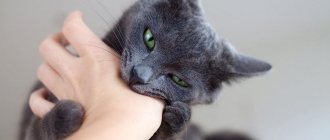Many adult cats and almost all baby kittens love to chew on the wires that are available in the house. Take, for example, television, telephone and computer wires or garlands - all of them can be damaged by the sharp teeth of pets. Are such games dangerous? Undoubtedly! Not only can household appliances fail, but the pet itself can easily suffer from electric shock or suffocation if the wire is wrapped around the neck, that is, such pampering can lead to death. In this article we will figure out how to stop a cat from chewing wires.
How to stop your cat from chewing wires
Not all, but some kittens are attracted to hanging wires in the house: telephone, computer, audio and others. All other pranks of pets, such as turning over flowerpots, holes in curtains, torn wallpaper, are not comparable in their danger to chewing live wires. Therefore, if an animal has such a bad habit, it is necessary to wean it off. It’s worth thinking in advance about how to protect him from injury or, worse, from death.
Cable chewing can cost a cat's life
Applying a special product to the wires
As you know, cats do not like strong and unpleasant aromas, for example, the smell of citrus. Therefore, veterinarians recommend treating cats’ “favorite” wires with a special spray, for example, Antigryzin. It has a sharp citrus aroma, thanks to which the cat will not come close to its “toy”. In addition, the product can be used to treat all places or objects that are threatened by your pet’s claws or teeth. You can purchase the spray at any veterinary pharmacy.
Important! Caring for the safety of the animal will help avoid death.
Hiding the cables
This method 100% guarantees that the animal will not get to its “toys”. To do this, you do not need to leave, for example, headphones or a phone charger freely available to your pet. All hanging wires need to be hidden as much as possible, or pushed behind the baseboard. Then the animal and equipment will be completely safe.
Wiping wires with repellers
Folk remedies work 100% as a repeller. An excellent option would be to rub the cables in the house, for example, with lemon peel or aloe juice. Lemon has a pungent smell that cats cannot tolerate, and aloe juice has a bitter taste that the pet will not like and the cat will no longer go near its “toys.”
"Anti-gryzin" for wiping wires
Games and toys for your pet
In most cases, kittens begin to chew wires due to the absence of owners and complete loneliness. Therefore, before asking yourself the question of how to stop a cat from chewing electrical wires, you should first take care of the variety of his leisure time.
You need to try to build a play area for the animal where he can spend time. It is worth buying him a variety of balls, squeakers and other entertainment items.
Advice! In addition to purchasing toys, you need to devote maximum of your free time to your pet.
What to put on the wires to wean them off
Any bitter taste is unpleasant for the cat. You can lubricate the surface of the wires:
- fresh orange peel (outer part);
- the middle of an aloe leaf;
- a clove of garlic or onion;
- soap solution with pepper - the animal will not like the bitter taste.
Disadvantage of methods (with the exception of soap): the unpleasant odor quickly disappears, and bitterness ceases to be so when interacting with oxygen. The electrical cord will have to be processed several times.
Attention. Before applying liquid products, you must turn off the electricity!
Industrial products will help you stop your kitten from chewing both wires and the plug:
- Varnish for children with quinine (with brush included).
- Infusion of wormwood, buckthorn (1 teaspoon per third cup of boiling water, leave for 2 hours).
The main reasons for showing interest in wires
Life hacks on how to protect wires in the house from animals
If a cat has chewed through an electrical wire, then there is some reason for this behavior. The main ones are described below.
Curiosity
At birth, kittens learn about the world and are attracted to everything that lies, hangs, or moves incorrectly. Cats are playful animals by nature, so there must be special toys in the house that will help avoid cutting wires in the absence of their owners.
Attention deficit
Kittens, like small children, constantly need attention, and in its absence they look for a replacement: they tear up wallpaper, scratch furniture, tear curtains, and also begin to bite wires. Thus, the animal simply attracts attention to itself, in dire need of communication.
Lack of communication
Scratching teeth
Kittens may begin to chew on wires when they are changing their baby teeth to permanent ones. The gums itch and you want to scratch them. Why not bite the wires if the owner did not worry about this in advance and did not purchase special toys that could be used to scratch the gums.
Adult cats begin to chew the cables, thus cleaning their teeth from the plaque that has formed. This happens because the animal consumes liquid food all the time. Plaque accumulates on the teeth, which must be removed by gnawing on something hard.
Attention! To avoid cable biting as an adult, it is necessary to alternate liquid meals with dry food to remove plaque.
Lack of useful microelements and vitamins
If an animal lives on the street, then it itself compensates for the lack of vitamins in the body by eating grass and other necessary plants. But things are more complicated with pets. They receive all the necessary vitamins and microelements exclusively from special food, but their lack can provoke gnawing on wires and eating flowerpots, because the animal tries to make up for their deficiency.
Few toys
Most owners, when kittens appear in the house, do not spend money on purchasing special toys, because you can easily and quickly make them yourself, for example, tie a small piece of paper to a rope, or take a ribbon and tie it to something so that the animal can play. As a result, over time, the animal begins to grab wires, which will look like ropes, ribbons, temptingly hanging from tables, windows and other places. To avoid this in the future, you should buy toys specifically designed for cats.
Why does a kitten or cat chew wires?
It’s interesting that most of the mustachioed friend’s pranks are not a desire to spoil the mood of his beloved owner. Basically, Skoda is a simple curiosity and desire to play.
Toy shortage
Curiosity is characteristic not only of children, but also of adult representatives of the cat family. Pranksters want to taste, touch surrounding objects, and play with them.
All they need is a candy wrapper they find, a piece of ribbon or a juice straw to have fun for a few hours. That's why mustaches are beginning to be interested in electrical cables that look like ribbons. Multi-colored cords become an alternative to toys or even a ball of thread.
Desire to sharpen teeth
Dental problems accompany furry pets throughout their lives. Interest in electrical cables in growing kittens can be explained by the replacement of milk canines with permanent ones. The natural process is accompanied by slight discomfort - the baby’s gums itch, so there is a natural desire to rub them.
Adults use electrical cables to clean plaque from their teeth. Here the problem arises due to the pet’s improper diet - if the cat eats mostly soft food, then plaque from the teeth is not cleaned naturally. The introduction of dry ingredients will help relieve your pet of discomfort and the desire to chew on everything.
To attract attention
Pets are very attached to their owner and his family members. Some individuals experience real stress during the absence of a loved one. Cats, like little children, want attention.
If a cat lacks communication, it begins to attract its owner in different ways. Sometimes the mustache throws objects from tables or flower pots from windows. The bitten cords from electrical appliances also become an attempt by the cat to attract the attention of the owner, expressing himself in a request to devote time to the furry minx.
Lack of vitamins
In their natural habitat, representatives of the cat family have always made up for the lack of elements important for life by eating different types of plants or gnawing on branches and bark. Pets do not always have the opportunity to walk in the fresh air. The only source of vitamins and minerals for them is food.
Pets try to make up for the lack of essential microelements in all possible ways. They chew on houseplants, wooden furniture legs, metal objects and electrical cords. The latter are impregnated with special compounds that emit a characteristic chemical odor. It is these aromas that attract some mustaches with vitamin deficiency.
Possible consequences of playing with wires
How to stop a dog from chewing everything in the absence of the owner
We figured out how to protect electrical wires from the cat. But what to do to avoid negative consequences? In some cases, this fun leads to the inevitable death of a pet. Therefore, to keep your animal safe, you need to follow some tips:
- In places where the wire is accessible to the animal, it is sometimes necessary to check its integrity.
- If the wire is not insulated, it should not be left in the room with the animal even for a minute.
- If the house is undergoing renovations, the animal must be moved to another place during this time.
Consequences of playing with cables
But if the pet could not be saved and it was electrocuted, then the following precautions must be observed:
- You cannot handle an animal without gloves;
- Don’t panic, but react quickly; every second can cost your pet’s life.
Worth remembering! The owner's quick reaction will help save the animal's life, so the main thing is not to panic.
Wire insulation methods
Get ready for the fact that cats are very stubborn and are able to reach the cable in the most impossible ways.
The simplest and most effective means of protecting cables is their insulation. It helps protect the integrity of the cable and reduces risks to the animal's health.
Table 1. Wire insulation methods
| Method | Implementations and notes |
| Cleaning | All unused wires must be removed out of reach of the animal. Chargers can be hidden in a closet, in a table or on a high shelf. And those cables that are used less than a few times a week can be put away in a special box |
| Tubes | The most convenient way is to hide constantly used wires in special tubes. Cats also show interest in cables because they are small in size and therefore easy to chew on. Tubes for wires are sold at building supply stores. They are large enough that cats cannot damage them, making them great for protection. |
| Ties | Ordinary construction ties can also help insulate cables. When the diameter of the wire increases, the purr becomes uninterested in playing with it, and it becomes more difficult to chew on it. Therefore, this method also helps to protect the cables and put them in a certain order. |
| Fastening to furniture | Those wires that cannot be removed and hidden are recommended to be secured to the furniture as much as possible so that they do not dangle. To do this, you can use a construction stapler or special fasteners. |
| Skirting boards | An excellent way to insulate is baseboards. Modern models have special sections for wires. If there are no such compartments, you can disconnect the baseboard and lay the cable under it. This method will not only protect the pet, but also preserve the aesthetics of the room. |
| Treatment with special substances | There are a number of substances whose smell repels cats. But here it is important to maintain a golden mean - not to choose scents that will make the owners feel unwell and at the same time periodically refresh the treatment |
| Double sided tape | Cats really do not like sticky substances and surfaces, and therefore one of the insulation methods can be called double-sided tape. Your pet is guaranteed not to play with the sticky cable. But this method has its drawback - dust and pet hair will constantly collect on the sticky surface, and therefore the wire will quickly look untidy |
| Foil | Despite the fact that foil can rustle interestingly and shines quite brightly, cats do not like to play with it. The reason for this is the alkaline taste that appears when you chew it. Therefore, this method can also be used as protection for cables. But there is a possibility that the animal's interest will be renewed after the foil is removed |
Actions of the owner when an animal receives an electric shock
What to do if a cat chews wires?
It is important not to make mistakes, so as not to get hurt yourself, and to help the animal. Here's what to do:
- Carefully, wearing gloves, unplug the cord from the outlet.
- Take a stick or mop (wooden) and move the cable further away, but under no circumstances pick up the animal.
- If the pet does not show signs of life, you should take it by the hind legs, turn it upside down and twist it in different directions. This will improve blood flow to the brain.
- If after 15 seconds the cat still does not show signs of life, try to give him artificial respiration.
- Everything should take no more than three minutes from the moment of impact.
Therefore, having cat proof electrical wires is very important. This will help avoid playing with dangerous objects and further negative consequences.
What to do with kittens
Kittens are the most curious, because they are just beginning to learn about the world around them. Therefore, like small children, they are interested in touching and tasting unfamiliar objects. Under no circumstances should you beat or punish a kitten, because it may not understand what it is doing wrong.
It is important to be patient and try to wean your pet from a bad habit in humane ways:
- Provide the kitten with enough toys.
- If possible, insulate and hide cables located on the floor.
- Store cables, chargers, headphones, etc. in a place inaccessible to the kitten.
- Feed your pet a balanced mixture and periodically give vitamins.
- Spend more time communicating with the animal.
- Maintain the hygiene of your pet's teeth.
What to do if your pet is electrocuted
It is not easy to stop a cat from chewing wires, especially if the animal has this bad habit in old age. It happens that if the owner is at home, the cat restrains himself, but still continues to play around when left alone (alone at home or alone in the room).
What to do if a cat has all the signs of an electric shock (pallor or even cyanosis of the mucous membranes, arrhythmia and slow pulse, convulsions, weakness, breathing problems, minor lesions on the skin, loss of consciousness)? If the owner is lucky and notices an electrical injury in his purr in time, he needs to act like this:
- Stop panicking. You cannot immediately scream or grab the cat without rubber gloves (this can lead to an electric shock);
- If possible, you need to pull out the faulty wire from the socket using something non-metallic (a wooden mop, a broom, you can pull it out with your hand, but with a rubber glove). If you cannot pull out the wire, you must at least throw it off the animal;
- Then the cat needs to be raised in the pelvic area so that the lower legs are higher than the level of the head. Another option is to lift the cat by its hind legs and twist it a little. This must be done to provoke blood flow to the brain;
- If about 15 seconds have passed and the animal has not regained consciousness, you will have to perform artificial respiration, exhaling air from the pet’s mouth into the nose 12-15 times per minute (each exhalation is about 5 seconds). The pet should be laid on a flat surface on its right side. It is important to ensure that your pet exhales air. Simultaneously with artificial respiration, it is advisable to massage the heart by pressing on the chest, as if lifting the ribs to the neck. You need to do about 100 pressures per minute. If there is a family member at home, you need to ask him to urgently call a veterinarian at home. A specialist will be able to resuscitate the animal better and faster;
- If the pet has come to its senses, it needs to be calmed down and then given some water to drink. An electric shock burn can be lubricated with sea buckthorn oil, Solcoseryl, Levomekol or other similar ointment. You definitely need to make sure that the mustachioed striped one does not approach the faulty wire again.
Third method: aloe
Rub the wires themselves with aloe juice, it is very bitter. A reaction in the form of drooling is possible. Cruel but effective. Then you can rinse his mouth with water. Cruelty as opposed to the death of a pet, in this case, is justified.
If you grow aloe at home, try rubbing the juice of this plant on the wires. It is very bitter and after trying it just once, your pet will not like it in the near future. The method is very harsh, but effective and in any case better than the death of a pet.
Aloe juice
Important!!! If, after trying to gnaw on wires lubricated with aloe, the cat begins to drool temporarily and profusely, this is quite normal. You can rinse your mouth with water and everything will go away.











